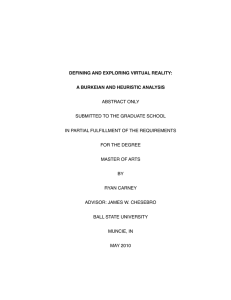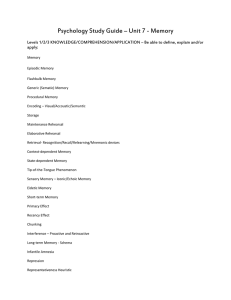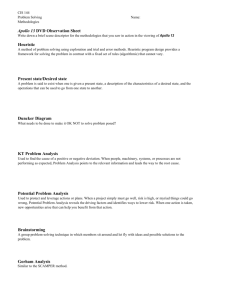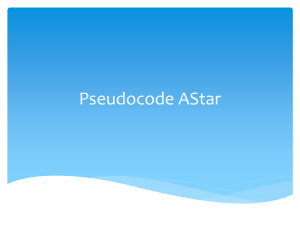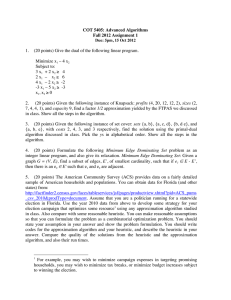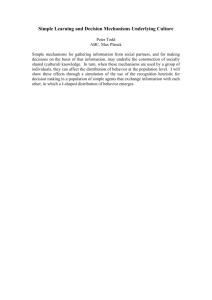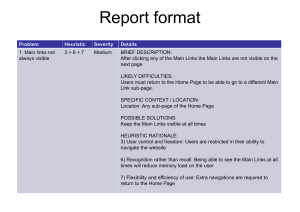12642036_AARE_2012.ppt (711.5Kb)
advertisement
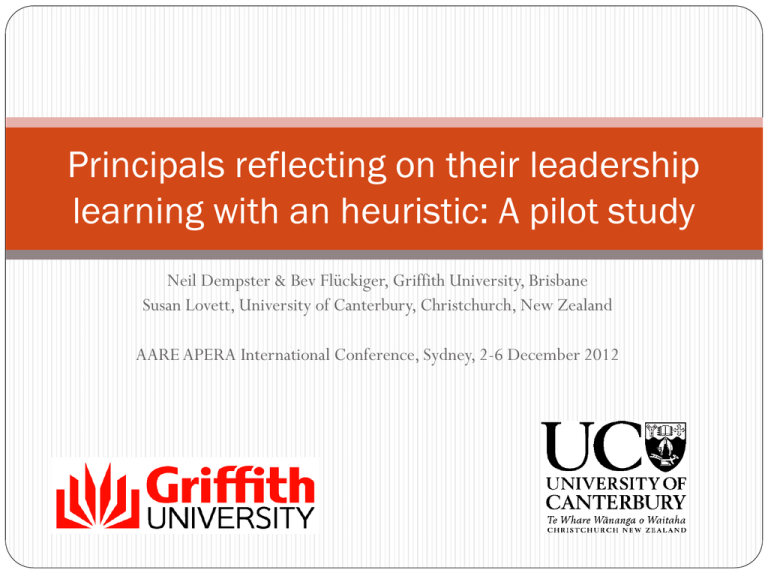
Principals reflecting on their leadership learning with an heuristic: A pilot study Neil Dempster & Bev Flückiger, Griffith University, Brisbane Susan Lovett, University of Canterbury, Christchurch, New Zealand AARE APERA International Conference, Sydney, 2-6 December 2012 Rationale for the Pilot Study AITSL Review: Strategies for the professional learning of school leaders (Dempster, Lovett & Flückiger, 2011) The review showed: Most leadership learning strategies were under the control of systems Studies of system organised learning were not balanced by studies of individual agency in leadership learning 2 Individual Agency in Professional Learning A lack of research attention to individual agency exposed by Timperley’s (2011): concern to differentiate between professional learning and professional development; and her worry that individuals expect others to make provision for their leadership learning and Clarke and Wildy (2011) who developed an heuristic tool highlighting individual agency 3 What is an Heuristic Tool? A device to help individuals observe, investigate, experiment and discover new knowledge. It applies especially to methods of teaching and learning. In this case we apply the tool to leaders’ learning. 4 An Heuristic Tool (from Clarke and Wildy, 2011) Place – understanding the context People – understanding those I work with Self – understanding ‘me’ System – understanding my employer and education at large We added Pedagogy to this heuristic to emphasise the importance of leadership for learning 5 Heuristic Tool Format Leadership focal point and knowledge inventory I plan to gain further leadership knowledge: Through Through Through With a I am organised discussion Informal mentor confident courses or with peers learning or in my workshops on the coach leadership (online or job knowledge face-to in this area face) or X Pedagogy 1. knowledge of growth, learning and development across the lifespan x 2. knowledge of effective strategies for teacher professional development 3. knowledge of the rationale for and how to plan, coordinate, implement, monitor and evaluate teaching and learning 4. knowledge about how to gather data and how to conduct evidence-based professional conversations on teaching and learning 6 x xx Heuristic Tool Focal Point Sample: Pedagogy 1. knowledge of growth, learning and development across the lifespan 2. knowledge of effective strategies for teacher professional development 3. knowledge of the rationale for and how to plan, coordinate, implement, monitor and evaluate teaching and learning 4. knowledge about how to gather data and how to conduct evidence-based professional conversations on teaching and learning 7 Heuristic Tool Format Leadership focal point and knowledge inventory I plan to gain further leadership knowledge: Through Through Through With a I am organised discussion Informal mentor confident courses or with peers learning or in my workshops on the coach leadership (online or job knowledge face-to in this area face) or X Pedagogy 1. knowledge of growth, learning and development across the lifespan x 2. knowledge of effective strategies for teacher professional development 3. knowledge of the rationale for and how to plan, coordinate, implement, monitor and evaluate teaching and learning 4. knowledge about how to gather data and how to conduct evidence-based professional conversations on teaching and learning 8 x xx The Pilot Trial No.1. 10 Primary and Secondary Principals Trial No. 2. 6 Beginning Primary Principals Opportunity Samples in each trial Online access with 3 open-ended questions 9 Open-ended Questions Please comment about the items in the heuristic and any issues in its completion; What changes and or additions would you suggest? The claim is that the heuristic should help principals better understand important aspects of their leadership learning profile. What response would you have to this claim? 10 Summary of Results – there was: a spread of learning activity and generally reported confidence in the focal point – Pedagogy variability reported in learning about People a favouring of courses or seminars about Place, with fewer reports of informal learning in work sites or with the use of a mentor on the System – learning with peers dominated an absence of reports of learning about Self through 11 courses, but frequent reports of learning about self with mentors. Results: Suggested Changes change column one to allow for differentiated responses on confidence, eg. very confident, somewhat confident, and not yet confident the need for an electronic heuristic design to enable individuals to record their expanding knowledge inventory An emphasis on the heuristic as one element of reflection processes to stimulate thinking and conversations with others about personal agency in leadership learning. 12 Conclusion - the heuristic tool offers: a useful tool for personal reflection, easily addressed in electronic form, allowing for adjustments in the light of personal knowledge needs the means for leaders to construct a current leadership learning profile, with future projections made visible a concentration on individual agency rather than system control of professional development agendas 13
